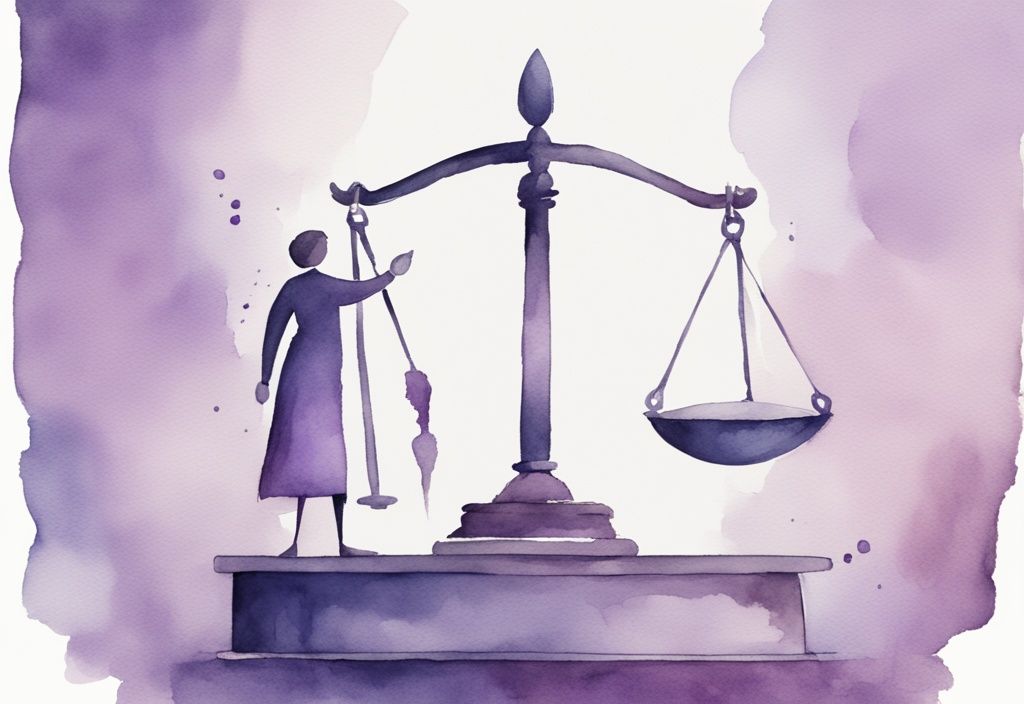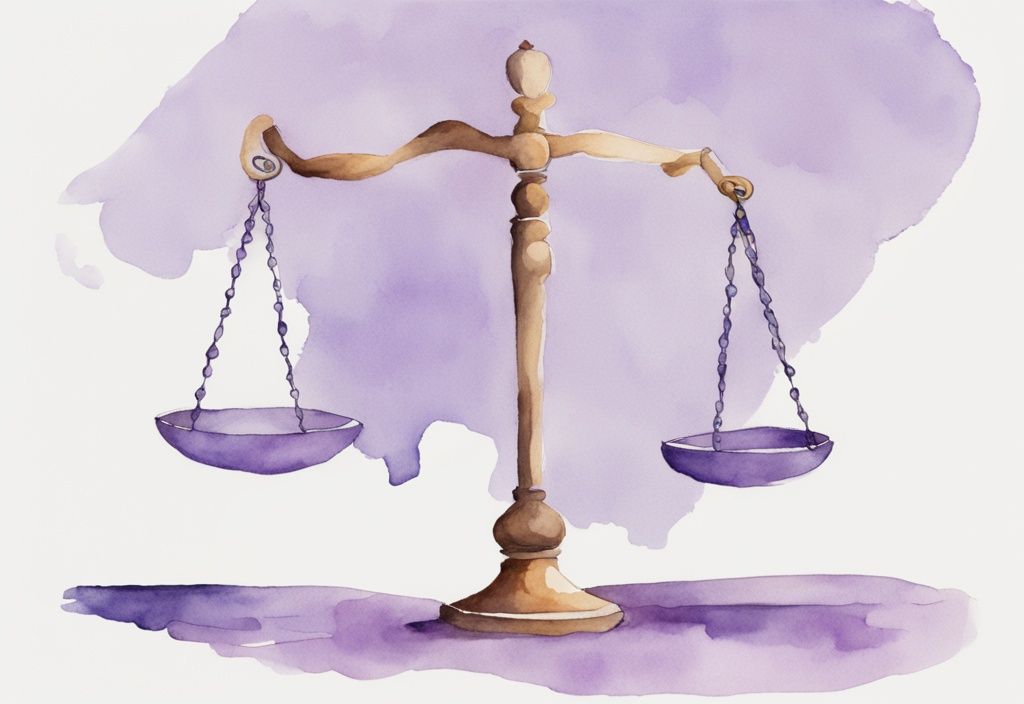Effective Strategies: How to Beat a Narcissist in Court Successfully
Ever felt utterly drained by the deceptive tactics of a narcissist in court? You’re not alone. Narcissists are notoriously manipulative and lacking in empathy, turning legal ordeals into exhausting battlegrounds. But don’t despair, hope is on the horizon.
This comprehensive guide will become your arsenal, packed with well-researched strategies, instructions for gathering crucial evidence, and emotional preparation methods. Whether it’s a divorce case or a custody issue, it’s crucial to arm yourself with this knowledge, ultimately guiding you towards safeguarding your rights and mental well-being.
Let’s dive in and unravel how to effectively counteract the scheming maneuvers of a narcissist in court. Trust me, with this guide at your side, you’ve just gained the advantage.
Understanding Narcissism and Narcissistic Personality Disorder (NPD)
Narcissistic Personality Disorder (NPD) manifests through a range of challenging behaviors that can significantly complicate interactions, especially in legal contexts, as detailed in this continuing education activity that explores the complexities of NPD. Knowing what to expect from a narcissist can arm you with the psychological tools needed to navigate and counter their tactics.
Traits of Narcissists
Narcissists exhibit a spectrum of distinct characteristics that play a pivotal role in their behavior, especially in confrontations like court battles. These traits include:
- Exaggerated self-importance: Narcissists often believe they are more important or capable than others, leading to an inflated sense of self-worth.
- Preoccupation with success, power, and beauty: They obsess over achieving success, gaining power, and maintaining a facade of perfection.
- Belief in being unique or special: They see themselves as unique and expect to be understood only by other high-status individuals or institutions.
- Need for excessive admiration: Constant validation and admiration from others are vital for their self-esteem.
- Sense of entitlement: They expect special treatment and assume others should cater to their needs without reciprocating.
- Exploitation of others for personal gain: Narcissists manipulate and exploit others to achieve their own ends, often without remorse.
- Lack of empathy: They struggle to understand or care about the feelings and needs of others.
- Envy of others or belief that others are envious of them: They exhibit envy towards others’ success or believe others are envious of their perceived superiority.
- Arrogant and haughty behaviors or attitudes: Narcissists often display arrogance and contempt towards others.
Common Manipulative Behaviors
In their pursuit of control and dominance, narcissists employ a variety of manipulative tactics, especially when they feel threatened. Understanding these behaviors is crucial for counteracting their impact in court:
- Gaslighting: They manipulate others into questioning their reality, making it hard to trust one’s own perceptions.
- Blame-shifting: Narcissists frequently deflect blame onto others, avoiding responsibility for their actions.
- Deception and lying: They consistently lie and twist facts to suit their narrative, creating confusion.
- Creating confusion and chaos: Narcissists thrive on chaos, making it difficult for others to function effectively under stress.
- Playing the victim: They often portray themselves as the wronged party to garner sympathy and discredit others.
- Using charm initially: Initially charming and charismatic, they win people over before revealing their true hostile nature.
Implications of NPD in Legal Battles
Facing a narcissist in court presents unique challenges. Recognizing how their disorder affects legal proceedings is essential for formulating an effective strategy on how to beat a narcissist in court:
- Refusal to compromise: Narcissists are often unwilling to compromise, leading to drawn-out legal processes.
- Manipulating facts: They twist facts and portray themselves as victims, complicating the search for justice.
- Using the court system: Narcissists may leverage the legal system to punish or control their opponents, prolonging disputes and increasing emotional strain.
- Emotionally draining tactics: They employ various tactics aimed at emotionally exhausting their opponent, such as constant provocation or sudden legal maneuvers.
- Unpredictable behavior: Their unpredictable nature can create uncertainty, making it difficult to anticipate their next move.
- Exposing true character: To achieve fair outcomes, it is crucial to methodically expose their true character and behavior in court using evidence and witness testimony.
By understanding these traits and behaviors, you can better prepare for the challenges of facing a narcissist in court. Integrated strategies and a solid support system are essential components in how to beat a narcissist in court.
Preparing for Court
Engaging in a legal battle with a narcissist can be incredibly challenging and emotionally draining. It’s vital to equip yourself with the right tools, strategies, and mindset to navigate this complex process. This section delves into key strategies for effectively facing a narcissist in court, focusing on legal representation, self-education, and developing a tailored legal strategy.
Importance of Strong Legal Representation
- Hire a lawyer experienced in dealing with high-conflict personalities: Navigating the manipulative nature of narcissists requires a legal expert who can anticipate and counter their complex tactics. Such an experienced lawyer will be your cornerstone in this battle.
- Ensure the attorney understands the nuances of NPD: Narcissistic Personality Disorder (NPD) brings unique challenges to the courtroom. Your lawyer’s deep understanding of NPD is crucial for effectively countering the narcissist’s behaviors and maintaining a strong case.
- Legal representation should be adept at countering manipulative tactics: A seasoned lawyer will recognize and dismantle the narcissist’s deceitful strategies, fortifying your case with clear, factual evidence.
- The goal is to advocate effectively and maintain objectivity in court: Professionalism and focus on factual evidence will help expose the narcissist’s true nature, challenging their manipulative facade.
Educating Yourself on Narcissistic Tactics
- Research common narcissistic behaviors and strategies: Understanding the predictable patterns and manipulative techniques used by narcissists will prepare you to anticipate and counter their moves.
- Understand their emotional and psychological manipulation tactics: Knowing how a narcissist distorts reality and exerts control helps you stay grounded, ensuring you can effectively counteract their schemes.
- Learn about gaslighting, blame-shifting, and emotional abuse: These tactics can destabilize you if unrecognized. Familiarizing yourself with these methods ensures you remain composed and factual when confronted with them.
- Prepare yourself to stay calm and collected under pressure: Emotional preparedness is critical when facing a narcissist. Maintaining your composure can blunt their attempts at manipulation and create a stronger, more credible court presence.

Developing a Tailored Legal Strategy
- Plan a strategy that anticipates and counters the narcissist’s tactics: Collaborate with your lawyer to craft a well-rounded strategy that preempts the narcissist’s manipulative maneuvers, ensuring you stay one step ahead.
- Focus on factual evidence and avoid emotional arguments: Ground your case in clear, objective facts. This approach highlights the narcissist’s behaviors without falling into the trap of emotional entanglement.
- Ensure your strategy includes clear boundaries and consequences: Establish firm limits and clearly define the repercussions for any overstepping by the narcissist, reinforcing the strength of your case.
- Work with your lawyer to present a systematic and coherent case: Organize your evidence and arguments in a logical, systematic manner, enhancing the clarity and persuasiveness of your court presentation.
Gathering and Presenting Evidence
The battle to beat a narcissist in court hinges on the strength and clarity of your evidence. Let’s explore how to meticulously gather and confidently present the proof needed to make your case.
Collecting Witness Statements and Documentation
- Gather statements from third parties who witnessed the narcissist’s behavior: Imagine weaving a tapestry; each thread is a testimony from someone who has directly seen the narcissist’s actions. These unbiased witnesses fortify your narrative, stitching together a compelling case.
- Collect all relevant documentation, including emails, texts, and voicemails: Every communication from the narcissist is a piece of the puzzle. Archive emails, texts, and voicemails diligently. This chronological collection unfolds the story of their behavior, one message at a time.
- Keep detailed records of all interactions and incidents: Think of yourself as a meticulous historian. Note down every interaction with precision, including dates and specific details. Understanding how to piss off a narcissist can also provide valuable insights into their behavior patterns. These records provide a detailed map of incidents that spotlight the narcissist’s actions.
Utilizing Tools Like Our Family Wizard
- Use Our Family Wizard to document interactions and communications: Picture Our Family Wizard as your digital ally. This platform records each exchange with the narcissist, creating a secure, comprehensive log of your interactions.
- This tool can provide court-admissible records of communications: Communications logged here aren’t just organized but also admissible in court. This helps to establish a solid factual foundation for your case, reinforcing your credibility.
- Helps to organize and present evidence systematically: Our Family Wizard assists in sorting and categorizing evidence systematically, ensuring your presentation in court is logical and clear. It’s your virtual filing cabinet, keeping everything in order.
Presenting Evidence in a Coherent and Systematic Manner
- Organize all documents and evidence meticulously: Approach this as though you’re curating an exhibit. Sort, label, and categorize your evidence carefully. A well-organized collection ensures ease of retrieval and clarity during court proceedings.
- Present your case in a structured, fact-based manner: Like a seasoned storyteller, lay out the facts in a logical sequence. Your narrative should be devoid of emotional outbursts; let the documented evidence reveal the truth.
- Avoid emotional language and focus on objective facts: Emotions can muddle your case. Maintain a neutral tone, focusing solely on verifiable facts. This objectivity underscores the gravity and truth of your claims.
- Use tools and technology to enhance the clarity of your presentation: Visual aids and digital platforms can be powerful tools. Think of them as your co-narrators, making your evidence more digestible and impactful to the court. Clarity and coherence are your best allies.
Emotional and Psychological Preparation
Navigating a court case involving a narcissist demands both emotional and psychological resilience.
The tactics employed by narcissists can be draining, which makes it vital to enter this battle well-prepared. Below, you will find essential tips on building a strong support system, securing mental health support, and maintaining composure and objectivity in court. These strategies aim to fortify your mental frame and enhance your courtroom resilience, offering you a solid foundation to counteract narcissistic manipulations.
Building a Strong Support System
- Establish a network of friends, family, and support groups: Surround yourself with a dependable network of individuals who understand your situation. Choose people who can provide emotional support and practical advice.
- Seek emotional validation and strength from your support system: Share your experiences and feelings with trusted individuals to gain validation and emotional strength. They can offer a different perspective and help you stay grounded.
- Engage with individuals who can provide character reference letters: Identify supportive friends or colleagues who can provide character references. These letters can be crucial in court, showcasing your credibility and character consistency against the narcissist’s manipulations.
Securing Mental Health Support
- Work with a therapist or counselor to manage stress and emotions: Regular sessions with a mental health professional can provide coping strategies and emotional resilience. Therapy offers a safe space to process your feelings and prepare mentally for court.
- Secure mental health support to cope with the challenges of the case: Legal battles with narcissists are exhausting; professional mental health support ensures you remain emotionally balanced. This support is vital for facing manipulative tactics without losing composure.
- A therapist can help prepare you mentally for court appearances: Therapy can include role-playing exercises to practice responding to provocations calmly. Your therapist can guide you in maintaining objectivity and managing anxiety during court proceedings.

Maintaining Composure and Objectivity in Court
- Practice staying calm and composed in stressful situations: Engage in mindfulness exercises, deep-breathing techniques, or meditation to enhance your stress tolerance. These practices can help you stay calm, even when provoked by the narcissist.
- Focus on being factual and objective, avoiding emotional responses: Prepare your testimony and evidence presentation by sticking to verified facts. Avoid getting entangled in emotional arguments, which the narcissist may incite to undermine your credibility.
- Maintain a professional demeanor to strengthen your credibility in court: Dress professionally, speak clearly, and exhibit confidence. A calm, measured approach will enhance your credibility, contrast the narcissist’s erratic behavior, and help you beat a narcissist in court.
Legal Tactics to Counter Narcissistic Behavior
Setting and Enforcing Boundaries
Establish firm boundaries to restrict the narcissist’s manipulative behavior: Clear and non-negotiable boundaries are your armor. Define unacceptable behaviors explicitly and communicate these limits to both the narcissist and your legal team. This strategy helps to curb manipulative tactics, offering a structured foundation for your legal actions.
Use legal orders to enforce boundaries and prevent direct contact: Legal measures such as restraining orders, no-contact orders, or orders of protection can ensure the narcissist respects your boundaries. These orders legally mandate distance and limit direct interactions, fortifying your stand.
Ensure all interactions are documented and follow legal protocols: Keep exhaustive records of every interaction. Utilize tools like Our Family Wizard for tracking and documenting communications, ensuring everything is admissible in court. This systematic documentation creates a factual record of any boundary violations.
Avoiding Direct Confrontation
Let your attorney handle direct interactions with the narcissist: Delegate direct interactions to your lawyer to prevent potential conflicts. Attorneys are trained to manage these exchanges professionally, navigating negotiations and communications without the emotional burden.
Avoid engaging in arguments or confrontations: Maintain professionalism by engaging with the narcissist only through legal channels. This approach minimizes emotional manipulation, ensuring the process remains formal and fact-based.
Respond to the narcissist through legal channels and keep communication formal: Communicate via official documentation or through your lawyer. Keeping exchanges formal diminishes the narcissist’s ability to create disorder and ensures all communications can be scrutinized in court if necessary.
Leveraging Expert Testimony
Consider using expert witnesses to explain NPD to the judge: Psychologists or other experts can provide an analysis of the narcissist’s behavior. Their testimony can highlight NPD traits and impacts, offering the court crucial insights.
An expert can provide professional insights into the narcissist’s behavior: These professionals can clarify how specific behaviors align with NPD characteristics, aiding the judge in understanding the psychological context.
Their testimony can reinforce the factual nature of your claims: Expert testimony bolsters the credibility of your claims, underscoring the factual basis of the narcissist’s actions. This can be essential in revealing the manipulative tactics to the court.
Strategies During Court Proceedings
Navigating a court battle with a narcissist can feel overwhelming. These strategies will help you stay grounded and increase your chances of success.
Staying Factual and Objective
- Focus on presenting facts and evidence without emotional bias: In your quest to beat a narcissist in court, grounding yourself in documented facts and verifiable evidence is essential. Avoid dramatization or subjective statements that could be perceived as emotionally charged, steering clear of any bias.
- Avoid getting drawn into emotional arguments: Narcissists thrive on emotional chaos. By staying detached and refusing to engage in emotional arguments, you maintain your credibility and ensure the proceedings remain focused and on track.
- Systematically present your case, highlighting the impact of the narcissist’s actions: Organize your evidence in a clear and coherent manner. Whether you choose chronological order or categorize evidence by topics such as financial manipulation or emotional abuse, make sure to underscore the direct consequences of the narcissist’s behavior.
Demonstrating the Impact of Narcissistic Behavior
- Highlight how the narcissist’s behavior has affected your rights and interests: Emphasize specific instances where the narcissist’s actions have infringed upon your legal rights or caused significant harm. Use factual details to substantiate your claims, keeping in line with the court’s expectations.
- Provide specific examples and evidence of manipulation and deceit: Document instances of gaslighting, blame-shifting, or other manipulative behaviors. Screen captures, emails, and text messages can serve as compelling evidence to illustrate the patterns of deceit and manipulation.
- Explain the emotional and psychological toll in a factual manner: While showcasing the emotional impact is necessary, ensure these experiences are framed in a factual context. For instance, mention any diagnosis of stress-related disorders backed by medical records to underscore the psychological toll.
Responding to Manipulation and False Accusations
- Be prepared to counter false accusations with solid evidence: Keep comprehensive records of all interactions that can be used to disprove any false claims made by the narcissist. Consistently presenting detailed evidence can help undermine their credibility.
- Document all interactions to refute any lies or distortions: Maintain detailed logs of conversations, including dates, times, and content. These records can be invaluable in establishing a pattern of dishonesty and manipulation by the narcissist.
- Respond calmly and factually to any provocations from the narcissist: When the narcissist tries to provoke you, stay composed. Responding with factual rebuttals without getting emotional demonstrates your stability and reliability to the court.

Post-Court Considerations
Ensuring Compliance with Court Orders
After a legal battle, it’s essential to focus on ensuring that court orders are followed, as this safeguards the justice you’ve fought hard to achieve.
- Monitor the Narcissist’s Compliance: Keep a vigilant watch on whether the narcissist follows court orders. This vigilance is crucial in upholding justice and protecting your rights.
- Filing Motions for Contempt: Should the narcissist fail to comply, swiftly file motions for contempt. This legal measure reinforces the necessity of compliance and demonstrates your commitment to accountability.
- Consulting Your Attorney or Victims’ Rights Advocate: Regularly consult with your attorney or a victims’ rights advocate to navigate post-court hurdles effectively. Their expertise is invaluable in preventing the narcissist from exploiting any legal loopholes.
Preparing for Long-term Challenges
Understanding that the fight doesn’t end with a court ruling is essential for your long-term well-being. Prepare proactively for ongoing challenges to maintain resilience.
- Maintaining Long-term Resilience: Arm yourself emotionally and mentally for sustained challenges. Recognizing that narcissistic behavior might persist can help you stay strong over time.
- Anticipating Future Problems: Stay vigilant, as the narcissist may continue their manipulative tactics even post-ruling. Strategize ways to counter any new issues they might introduce.
- Focusing on Strategic Goals: Keep your eyes on strategic and long-term goals. This involves setting new boundaries and engaging in forward-thinking planning to manage potential future issues effectively.
Celebrating Your Victory
Amidst the ongoing effort, take moments to celebrate the victory you’ve achieved. Recognizing both emotional and legal wins is a crucial part of the healing process.
- Recognizing Your Stand: Reflect on the significance of standing up against manipulation. Acknowledge your courage and determination as key components of your personal growth.
- Acknowledging Emotional and Legal Wins: Celebrate both the emotional and legal victories. Recognize every step you’ve taken toward securing your well-being and justice.
- Healing and Rebuilding: Devote time to healing and rebuilding your life after the court battle. Reconnect with your passions, strengthen your support system, and focus on nurturing your mental health as you move forward.
Conclusion
Summarize the Main Strategies for Beating a Narcissist in Court
Understanding how to beat a narcissist in court necessitates a strategic and comprehensive approach. The key strategies encompass meticulous preparation, extensive evidence gathering, and maintaining emotional resilience. Start by educating yourself on narcissistic behaviors and manipulation tactics.
Develop a tailored legal strategy that anticipates and counters these behaviors by focusing on factual evidence, clear boundaries, and systematic presentation. Utilize witness statements and documentation tools such as Our Family Wizard to keep interactions well-documented and court-admissible.
Emphasize the Importance of Preparation, Evidence, and Emotional Resilience
Preparation is paramount when facing a narcissist in a legal battle. Invest time in understanding their tactics, gather solid evidence, and maintain detailed records of every interaction. Emotional resilience is equally important. Narcissists thrive on creating chaos and confusion, so staying calm and composed can be your greatest asset.
Building a strong support system and securing mental health support are crucial steps to maintaining your emotional well-being throughout the process.
Reiterate the Significance of Strong Legal Representation and Support Systems
Having a lawyer experienced in dealing with narcissists is essential. Such legal representation can effectively counter the narcissist’s manipulative tactics and bring objectivity to the courtroom. Your support system also plays a vital role. Engage with friends, family, support groups, and mental health professionals who can provide the emotional strength and validation needed during this challenging time.
Encourage Readers to Stay Factual and Composed to Expose the Narcissist’s True Behavior
Staying factual and composed is crucial in exposing a narcissist’s true behavior in court. Avoid emotional responses and focus on presenting hard evidence and objective facts. Demonstrating the impact of their manipulative actions with clear, factual examples can help reveal their true character.
By maintaining professionalism, you strengthen your credibility and increase the chances of achieving a fair outcome. Remember, the goal is to outsmart the narcissist with preparation, resilience, and an unwavering focus on facts.
FAQ
What are the key traits of a narcissist in court?
Narcissists in courtrooms are often a dramatic spectacle. They exhibit an exaggerated sense of self-importance, a relentless craving for admiration, and a stark absence of empathy. They maneuver through legal proceedings like skilled puppeteers, manipulating those around them and presenting themselves as perpetual victims. Picture them as actors in a meticulously choreographed play, always vying for center stage.
Why is it important to have a lawyer experienced with narcissistic personalities?
Having a lawyer who’s well-versed in dealing with narcissists is like having an experienced guide navigating a labyrinth. They understand the underhanded tactics and erratic behavior that narcissists bring to the table. This knowledge empowers them to craft effective counter-strategies and provide strong, unwavering advocacy. Think of them as the shield that protects you from the unpredictable assaults of a narcissistic adversary.
How can I gather evidence against a narcissist?
Building an arsenal of evidence against a narcissist requires precision and diligence. Start by collecting witness statements that can unequivocally back your claims. Document every interaction meticulously—dates, times, and the nature of exchanges. Utilize communication tools like Our Family Wizard to keep a transparent record. Picture yourself as a detective piecing together a puzzle, each piece vital for revealing the bigger picture.
What should I avoid during interactions in court?
Engaging with a narcissist in court can feel like walking a tightrope. Avoid direct confrontations that can escalate tensions. Steer clear of emotional outbursts and futile arguments.
Allow your attorney to steer the ship, focusing on presenting factual, well-organized evidence. Imagine you’re a swan gliding gracefully across turbulent waters—calm and composed on the surface, even if you’re paddling furiously underneath.
How do I maintain my emotional well-being during a legal battle with a narcissist?
Safeguarding your emotional well-being amidst a legal battle with a narcissist is paramount. Recognizing the signs a narcissist wants your attention can help you understand their tactics and protect your mental health.
Surround yourself with a robust support network—friends, family, and mental health professionals. Secure emotional validation and cultivate an oasis of calm where you can recharge. Stay composed and professional, treating each court appearance like a scene in a play where you remain unshaken, no matter how tempestuous the storm around you.














Post Comment